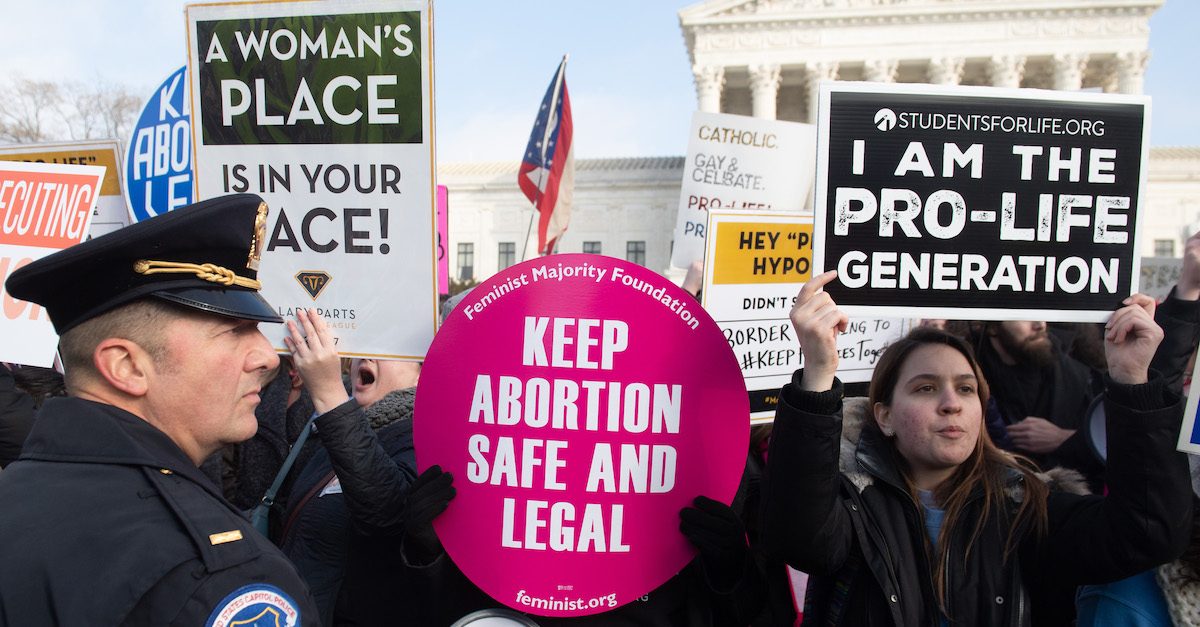
Weeks after the Supreme Court said it would hear the case of a Mississippi law that could severely limit the right to an abortion, the Eighth Circuit Court of Appeals on Tuesday ruled in favor of abortion rights on a similar law. The appellate court upheld a preliminary injunction against a 2019 Missouri bill that sought to prohibit some pre-viability abortions and expanded its reach to include a ban on abortions “solely based” on prenatal indicators of Down syndrome.
The “Gestational Age Provision” of Missouri’s HB 126 prohibits abortions “at eight weeks gestational age or later, except in cases of medical emergency.” The “Down Syndrome Provision” of the law completely prohibits abortions if the provider “knows that the women is seeking the abortion solely because of a prenatal diagnosis, test, or screening indicating Down [s]yndrome or the potential of Down [s]yndrome in an unborn child.”
Abortion providers who violate the gestational age provision could face criminal prosecution, while those who violate the Down syndrome provision could face civil penalties, and violations of either provision could result in professional discipline.
Reproductive Health Services of Planned Parenthood of the St. Louis Region (RHS) sued Missouri Gov. Mike Parson (R) over the law in 2019 and requested an injunction of both the gestational age and Down syndrome provisions. The district court had granted RHS’s injunction request as to the gestational age provision, but not as to the Down syndrome provision. Missouri appealed.
On Tuesday, however, the Eighth Circuit, in a 2-1 ruling, not only upheld the original injunction, but also granted the injunction against the Down syndrome provision.
In its ruling, the circuit court said that gestational age provision violates the longstanding precedents of Roe v. Wade and Casey v. Planned Parenthood, the latter of which allows certain restrictions on pre-viability abortions, but does not allow complete bans.
“[T]here is nothing an individual in Missouri could lawfully do to obtain an abortion at or after the applicable gestational age cut-off,” U.S. Circuit Judge Jane Kelly, a Barack Obama appointee, wrote in the majority’s ruling. “Instead, the Gestational Age Provisions are bans, and we agree with the district court that RHS is likely to succeed on the merits of this claim.”
In granting the injunction against the Down syndrome provision, the circuit court found that it was also an unconstitutional ban on abortion, and that RHS would likely succeed on the merits of its claim.
“Unlike a regulation, the Down Syndrome Provision does not set a condition that – upon compliance – makes the performance of a pre-viability abortion lawful, thus preserving the constitutional right to elect the procedure,” the court said in its ruling. “Rather, it bans access to an abortion entirely.”
Senior Eighth Circuit Judge Roger Leland Wollman, a Ronald Reagan appointee, joined Kelly’s majority opinion.
The state of Missouri had also argued that Planned Parenthood didn’t have standing, but the circuit court disagreed, concluding that the Missouri provisions “put physicians at risk of civil and criminal sanctions,” and that Planned Parenthood also “has standing to sue on behalf of its patients.”
One judge dissented in part, stating that while the injunction against the gestational age provision should be upheld, the Down syndrome provision should be allowed to stand.
“I would conclude that Missouri’s Down Syndrome Provision is a regulation,” U.S. Circuit Judge David Stras, a Donald Trump appointee, wrote in the dissent.
“[A]ll it does is limit the reasons for an abortion in certain narrow circumstances,” Stras added. “As long as a woman has at least two reasons for seeking an abortion, or her provider never knows that a positive Down Syndrome diagnosis, test, or screening is her sole reason for getting one, ‘the ultimate decision’ still lies with her. The statute is, in other words, a regulation, not a ban.”
Missouri Attorney General Eric Schmitt (R) said in a statement that he intends to take this case to the Supreme Court of the United States.
“My son Stephen has shown me the inherent beauty and dignity in all life, especially those with special needs,” Schmitt said, Fox 2 Now reported. “While we’re disappointed in the 8th Circuit’s decision, their decision does provide an avenue for this case to be heard by the Supreme Court, and we plan to seek review in the Supreme Court. I have never and will never stop fighting to ensure that all life is protected.”
Representatives for Planned Parenthood and Gov. Parson did not immediately respond to Law&Crime’s requests for comment.
Read the ruling, below.
[Image via SAUL LOEB/AFP/Getty Images]